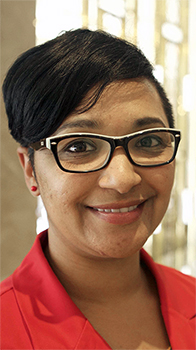#Women’sMonth: A career in Sign Language interpreting proves to be full of rewards for Natasha Parkins-Maliko

Natasha Parkins-Maliko. She
was recently awarded the Pansalb
Multilingual Award in the category:
Translation and Interpreting 2016/2017,
as recognition for her achievements
in a sixteen-year career.
Photo: Supplied
Natasha Parkins-Maliko is an alumna of the University of the Free State who graduated with a master’s in Linguistics. She is a well-rounded interpreter with a language combination of South African Sign Language-English-Afrikaans. She continued her studies and achieved an international master’s in Sign Language interpreting at the Humak University of Applied Sciences in Finland. Natasha was recently presented with the Pansalb Multilingual Award in the category: Translation and Interpreting 2016/2017, as recognition for her achievements in a sixteen-year career.
“Winning the Pansalb Translation and Interpreting Award for 2016/2017, was for me as Kovsie a pat on the back in the true sense of the word. The university is where I started my journey in South African Sign Language interpreting, and from then on, I never looked back,” she said.
Her interpreting career has provided many challenges, and was accompanied by great achievements along the way.
A career of fulfilment in Sign Language
“The foundation of my success was laid by my lecturers and mentors, such as Dr Philemon Akach and Emily Matabane, where I trained in the Department of South African Sign Language (SASL) at the university.”
“My determination and success is grounded in the motto, ‘Inspiring Excellence, Transforming Lives’ – a continued journey in excellence gives a renewed sense of pride for all language practitioners in South Africa,” she said.
Natasha went on to work in the deaf community for most of her career. She started as a grassroots interpreter, and is now a professional interpreter registered with SATI (South African Translators Institute). She is also a Sign Language television interpreter on SABC for content such as SABC 3 news bulletins, the budget speech, opening of Parliament, Youth Day broadcasts, January 8th statement broadcasts, MPC Reserve Bank speeches, and many more. Natasha is not only concerned with growing her career – despite her mover and shaker persona, she still takes time to volunteer her services for deaf people who do not have the financial ability to pay for interpreting.
“Winning the Pansalb Translation and
Interpreting Award for 2016/2017, was
for me as Kovsie a pat on the back in
the true sense of the word.”
The journey to excellence never stops
Over and above lecturing in Interpreting and Translation at Wits University, Natasha is still in pursuit of excellence. She is a PhD candidate in the SASL Interpreting programme at Wits University, the first of its kind in the country, and is pursuing an AIIC (International Association of Conference Interpreters) accreditation. Her aim is to put South African Sign Language interpretation on the global map.
As a role model and icon in her field, Natasha is the chairperson of the National Association of South African Sign Language Interpreters (NASASLI), the regional coordinator for the African Federation of Sign Language Interpreters (AFSLI), and the Africa regional representative on the board of the World Association of Sign Language Interpreters (WASLI). The award presented to her is no doubt a fitting accolade and something all UFS alumni takes pride in.